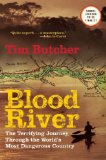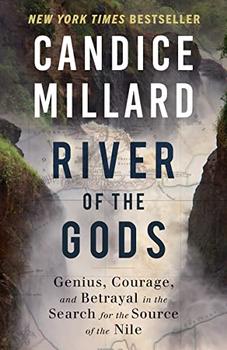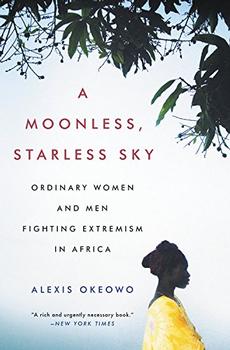Summary | Excerpt | Reviews | Beyond the book | Read-Alikes | Genres & Themes | Author Bio

The Terrifying Journey Through the World's Most Dangerous Country
by Tim ButcherBorn in 1967 in Warwickshire, England, Tim Butcher was educated
at Oxford before embarking upon his career as a journalist for The Daily
Telegraph. Since then, he has covered such crises as the Balkan wars of the
1990s, the Allied invasion of Iraq in 2003, and Israel's 2006 struggle with
Hezbollah in Lebanon. When he was posted to Africa in 1990 as the paper's chief
war correspondent and Africa Bureau Chief, he grew eager to
understand the Congo River (formerly known as the Zaire River) through a personal odyssey. This odyssey was to become a dangerous solo six-week journey, overland and by river, from Lake
Tanganyika to Boma, close to where the river spews into the Atlantic.
The title, Blood River, speaks volumes for the history of the region that
Butcher describes as 'Africa's broken heart.' Interweaving anecdotes
and historical accounts from earlier colonial explorers (such as H.M. Stanley
and David Livingstone), Butcher portrays a Congo that is mostly forgotten,
misunderstood, little known and destroyed. As he points out:
"The international community seems to have developed a terrible Congo-fatigue, where deaths and suffering, even on the enormous scale reported by statisticians, somehow don't register. The world seems to view Congo as a lost cause without hope of ever being put right."
This is not a book for those looking for a picturesque account of traveling in
exotic climes. Neither uplifting nor exaggerated, it is nonetheless
gripping. More crucially, it is revealing - yes, at times sad and grim, but also
real and humane. It reminds the developed world that the Congo has suffered,
still suffers, and will continue to suffer if the rest of the world continues to
leave it to decay in the midst of violence, poverty, diseases and exploitation.
The Congo that Tim Butcher depicts has a painful, difficult and tortured reality,
both past and present. Blood River raises more questions than
answers, including a seemingly simplistic irony, "Why are the Africans so bad at
running Africa?" - a paradox that indirectly sheds light upon the harsher reality: few in the rest of the world seem to care enough to ask the
question, let alone find the answer.
The most moving parts of Butcher's tale are his utter honesty and his beautiful
descriptions of everyone he encounters during his journey, and particularly
those who befriended him including George the campaigning pygmy,
the mysterious Mlle Nagant, Oggi the fisherman, and Benoit and Odimba who
risked their lives to ride with him on barely functioning motorbikes. Struggling on a daily
basis to survive, these ordinary yet decent Congolese men and women are the
courageous adventurers that Butcher looks up to, each a God-given precious life
breathing within Africa's broken heart.
The Congo River
In many places The Congo is as turbulent and mysterious as the
history of the countries that it runs through. Even tying down seemingly
basic facts such as its length are difficult, but roughly speaking it is about
2,920 miles long, which makes it the second longest river in Africa after the
Nile. It travels through a number of countries during its journey to the Atlantic Ocean, but the majority of its length is spent within or bordering the Democratic Republic of Congo (DRC).
 The Congo River is one of the most voluminous in the world (most sources
say it is second to the Amazon) discharging in the region of 1.5 million cubic
feet of water per second. Because its watershed drains from both the Northern and Southern Hemispheres its flow is
relatively stable all year because part of its watershed is always in the zone
of rain.
The Congo River is one of the most voluminous in the world (most sources
say it is second to the Amazon) discharging in the region of 1.5 million cubic
feet of water per second. Because its watershed drains from both the Northern and Southern Hemispheres its flow is
relatively stable all year because part of its watershed is always in the zone
of rain.
The river begins its journey in the savanna south of Lake Tanganyika
(believed to be the second largest fresh water lake in the world, which flows
into the Congo). It gradually widens and picks up speed before entering a
75 mile long canyon of impassable rapids, after which it enters an area of
tropical rainforest known as Lualaba or Upper Congo. Lualaba abruptly ends
with a 60-mile stretch of rapids known as Stanley Falls (after Henry
Morton Stanley who, in the 1870s, was the first European to navigate the river's
length and report that the Lualaba was not a source of the Nile).
After Stanley Falls the Congo continues smoothly for about a thousand miles of
navigable river, sometimes nine miles wide. Changing its course along this
stretch from north to west, and then south-west, the river eventually enters
Malebo Pool (also known as Stanley Pool), a fifty-mile lake which is flanked by
the capital cities of Kinshasa (DRC) and Brazzaville (Republic of Congo).
After slowing to a virtual stand-still through the lake, The Congo picks up pace
again as it drops more than 1,000 feet and flows through a 220 mile stretch of
rapids known as Livingstone Falls, before stretching out into its final 100 mile
fully navigable run to the Atlantic Ocean. One estimate suggests that the
32 cataracts in this last 220 mile stretch of rapids have as much power as all
the rivers and falls in the United States combined. Some of this potential
energy is being harnessed at Inga Falls - where two hydro power stations are
already located on the DRC side of the river. A larger project is
currently being considered that would create the largest hydro-electric
generator in the world, potentially double that of the current record holder -
the Three Gorges facility on the Yangtze River in China.
![]() This review was originally published in The BookBrowse Review in October 2008, and has been updated for the
September 2009 edition.
Click here to go to this issue.
This review was originally published in The BookBrowse Review in October 2008, and has been updated for the
September 2009 edition.
Click here to go to this issue.

If you liked Blood River, try these:

by Candice Millard
Published 2023
The harrowing story of one of the great feats of exploration of all time and its complicated legacy - from the New York Times bestselling author of River of Doubt and Destiny of the Republic.

by Alexis Okeowo
Published 2018
In the tradition of Behind the Beautiful Forevers, this is a masterful, humane work of literary journalism by New Yorker staff writer Alexis Okeowo - a vivid narrative of Africans who are courageously resisting their continent's wave of fundamentalism.
Your guide toexceptional books
BookBrowse seeks out and recommends the best in contemporary fiction and nonfiction—books that not only engage and entertain but also deepen our understanding of ourselves and the world around us.